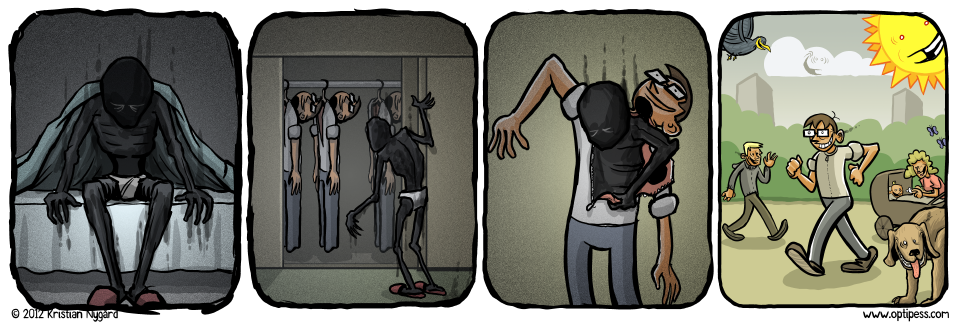Regarding Depression with the Sensitivity it Deserves
Let’s set things straight: depression is a serious medical illness.
Depression isn’t situational or short term. It’s not just a state of being sad; it severely interferes with daily life. Most of us with depression do not seek treatment and commonly feel hopeless, worthless, and undeserving.
It’s an alienating illness and it’s difficult to articulate to others what can only be understood by experience. Here’s a glance at the menu of symptoms that may affect us anytime or all the time:
Persistent sad, anxious, or empty mood
Feelings of hopelessness, pessimism
Feelings of guilt, worthlessness, helplessness
Loss of interest or pleasure in hobbies and activities that were once enjoyed
Decreased energy, fatigue, being “slowed”
Difficulty concentrating, remembering, or making decisions
Insomnia, early-morning awakening, or oversleeping
Appetite and/or weight loss or overeating and weight gain
Thoughts of death or suicide; suicide attempts
Restlessness, irritability
Persistent physical symptoms that do not respond to treatment, such as headaches, digestive disorders, and chronic pain

source: www.optipess.com
Living with depression is not a matter of choice. Most of us with depression are trying, given our limiting symptoms, to not be this way. But how can you fight something that you don’t know is surmountable? Depression doesn’t feel like an illness; it feels like a state of being – a permanence and identity.
The identification with depression is further reinforced when people offer situational solutions such as “go find something to make yourself happy” and home remedies like “eat chocolate, drink chamomile tea”. Even with good intents, their misguided efforts can further alienate the depressed and reinforce the belief that the depressed cannot be helped.
Could we blame those who are not fully equipped to address depression, when only recently did current research on mental illness became mainstream? Most people, including people with depression, don’t understand it (that’s why professionals exist, folks!). The general public is mostly equipped with prosaic sound-bites about happiness and other aphorisms, passed from one misunderstood generation to another that doesn’t quite address the larger problem.
Depression doesn’t feel like an illness, it feels like a state of being – a permanence and identity.
Consequently, the supportive network of friends and family often reaches a splintering point as it is very difficult for the untrained person to effectively talk to, and help, a loved one with depression. The dwindling return for their efforts fractures their faith in the relationship and even sows seeds of resentment. One by one, people distance themselves from those with depression – from us. We don’t blame them, we feel like we deserve alienation. Something malfunctioning in our thought patterns fully convinced us that we are undeserving of care, that we are not worthy, that our lives are wasteful blemishes on the earth, and that it’s selfish for us to stick around and burden everyone.
But we can all change that. Maybe we can’t prevent someone’s plunge into the depths of depression, but we can provide a supportive, safe, accepting, and thoughtful environment that will foster recovery.
Starting with each of us. We can be mindful of the things we say, curb the heuristics we rely on, and be open listeners – because one can never know if someone has depression. Depression talk is a very tricky language to navigate because it diverges so greatly from normative conversational habits. It’s a sensitive art, it’s meticulously researched, and requires being mindful of emotional triggers.
Here’s an easy list of things to say, or not to say, to someone with depression:
Don’t Say: “There’s always someone worse off than you are”
Do say: “You’re not alone in this. It will pass, we can go through this together.”
Do Say: “You’re right, this sucks”
Don’t Say: “Life isn’t fair/ deal with it / stop complaining/ it’s not about “you” all the time.”
Do Say: “You are important to me, important to us.”
Do Say: “I’m here if you need me.”
Do Say: “You are loved and invaluable.”
Do Say: “How can I help? I’m here if you want to talk”
Don’t Say: “Try not to be so depressed/ Just try harder/ Just pull yourself together/ Just don’t think about it.”
Do Say: “I know it’s hard to see this now – but know that this is temporary and things will change. You won’t feel like this forever.”
Do Say: “I can’t completely understand what you’re going through, but I can help you get through it.”
Do Say: “I am here for you, will be here for you through it, and will be there for you after it.
Don’t Say: “I get it, I was depressed once too/ Have you tried (insert homemade remedy here)?/ I’m just trying to help (insert other defensive remarks).”
Do Say: “I may not understand what you’re feeling but I can offer a shoulder when I can.”
Do Say: “Don’t worry about me, just focus on your recovery. I care about you and we will get through this together.”
Do Say: “A professional can help you. Let’s work on finding the right therapist or psychiatrist for you together. I can accompany you to your appointments.”
Don’t Say: “You’re being selfish/You’re doing this to punish me/You’re using depression as an excuse.”
Do Say: “I can’t always help you and I’m human too. But I care about you and will try my best, given whatever I have, to support you.”
Help is always a click or call away. For more resources on addressing depression and other mental illnesses, please visit Healthline and Nami.
You’re not alone.


